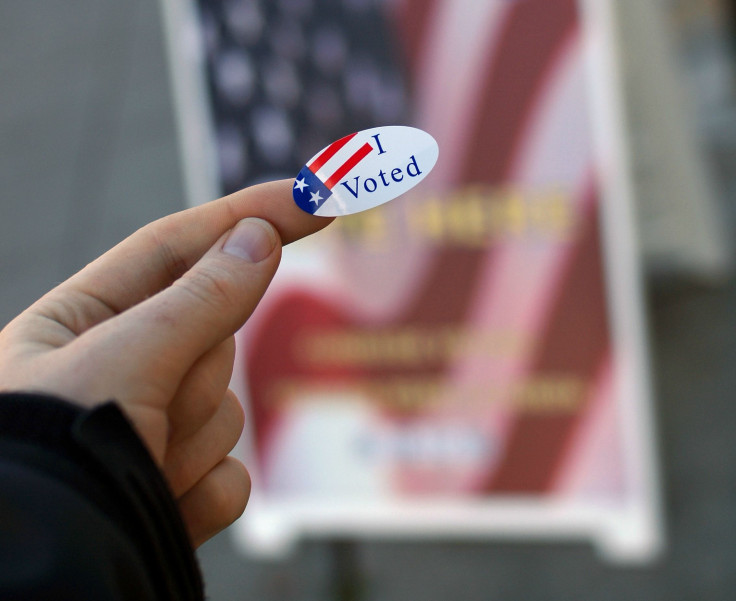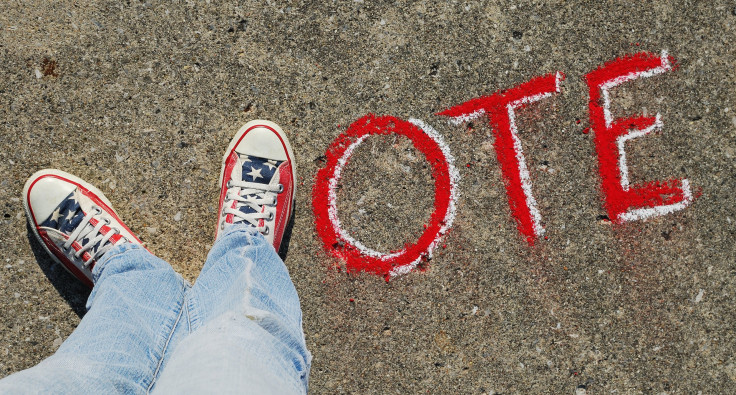Why Millennials Should Register To Vote In 2016: Voting Process Improves Mental Health, Social Connection

I never in a million years (which is totally realistic given I’ve been alive for 25) thought I’d be impassioned to talk about politics. For a long time, I avoided anything to do with the topic because I didn’t feel I had an adequate grasp of the issues at hand. I didn’t know governors from senators or whether I even identified as a Republican or Democrat. I also thought that if mine is one measly vote, it matters none if I show up to polls or not.
Ah, youth.
It was the spring semester of my freshman year in college when I realized how wrong I’d been. This was thanks in no small part to Hillary Clinton — a then-presidential candidate in the 2008 election — who came to speak at my college. I was buzzing along with the rest of audience as she spoke of a better future, but only on a surface level. I couldn’t really hook into anything she was saying since her positions were the first I’d bothered to listen to. And it was mostly because the event was free.
It’s no surprise then that when I finally bothered to tune into the political conversation at large, I found myself leaning in the same direction as my fellow millennials: liberal. The Pew Research Center surveyed 10,000 Americans and found millennials are considerably more liberal than other generations; older generations are progressively conservative. That’s not to say millennials don’t identify with the Republican Grand Old Party (GOP), even if it is slightly different from the traditional party older generations are used to. Pew added that among the third of millennials who affiliate with or lean Republican, just 31 percent have a mix of political values, while about half take a mix of liberal and conservative positions.
Pew then suggests millennials, which MSNBC reported are 93 million strong, are particularly the GOP’s problem. They can’t get young people to vote wholly on their behalf. While the GOP may have their work cut out for them, youth votes are universally hard to come across. Ashley Spillane, president of Rock The Vote, told MSNBC only 23 percent of eligible voters between the ages of 18 and 29 voted in 2013.
Spillane added the opportunity for youth voters to come out and make a real difference “has been overshadowed by ongoing partisan bickering and news coverage focused on the horse race of each election more than on the real issues that young people care about.” This can discourage participation altogether.
As hard as it may be to believe, voting is not a futile attempt to improve this country. If none other than to lend your voice to the issues you care most about, voting is great for health.
The Voting Community
Dr. Lynn Sanders, an associate professor at the University of Virginia, told CBS News ahead of the 2000 election that expressing the right to vote improves mental and physical health. In a study she conducted, she found voting eased stress and the other mental health problems that stemmed from economic, political, and social disadvantages. What’s more is that voting and being engaged in the political process can also reduce the risk of future mental health problems, mainly among those with a history of depression.
That’s not to say casting a vote automatically lowers cancer risk; no. What Sanders is saying is community involvement increases psychological wellbeing, which studies before and after hers have also found: A group of researchers from the University of California-Los Angeles concluded in 2013 that social connection is “our brain’s lifelong passion,” while a more recent study published in the Journal of the Royal Society Interface found the more socially connected people were, the more weight they lost.
Mostly, strong social ties and connection increase health and happiness. Cashing in on these benefits now may positively impact future children, Dr. Mark Zimmerman told CBS.
"Parents don't realize that even though kids can't vote they can learn about the voting process and learn about how their parents think about different issues," Zimmerman said. "There is also some evidence that talking about politics may help kids become better critical thinkers and help parents build communication patterns with their kids."
Even if the candidate you end up voting for loses, Zimmerman added that people are still happier with their decision to vote. OK, it won’t feel great to hear the opponent won, but making your opinion known by voting is psychologically very powerful.

Social Influences
Here’s where parental and otherwise outside influence gets tricky. Millennials — and everyone else for that matter — are social creatures. This means if individuals neither have the time or motivation to read up on important issues, they’re likely to vote for who their friends are voting for, which may be a person on the opposite side of their own viewpoints.
Dr. Alison Ledgerwood, an associate professor of psychology at the University of California-Davis, led two studies in 2012 that examined the relationship between abstract thinking, and how people’s attitudes and opinions change in response to the social situations. In the first study, college students took an opinion survey regarding local bicycle policy; either being told the policy would be implemented in the next month or next year. And in the second study, students were asked to indicate their stance on affirmative action, answering with either an abstract mindset (focusing on the why) or concreate mindset (focusing on the how).
The results showed the majority opinion of the group carries a lot of weight when it comes to distant, abstract decisions. Ledgerwood added that when thinking about a off-year election, individuals are especially likely to adopt whatever opinions are endorsed by a majority of the group members; the influential factor spikes considerably as an election nears.
We like to think very feeble things define us, from political views to how you feel about Oreo cookies, Ledgerwood told Medical Daily. In this culture especially, these things seem to indicate who we are as individuals. But in fact our opinions are much more influenced by others than we realize.
“A lot of the time that’s functional,” she said. “Outside of politics, just in life, it’s useful to go along with what most people think because often it’s the right answer. Ancestrally, if groups avoided poisonous food, it was better to be the sheep and follow the heard.”
Back inside politics, however, this isn’t always the case. Take pro-life legislation. Abortion opponents underestimate the number of women they know who’s had one, ThinkProgress reported — one in three women will have an abortion in their lifetime. Women are less likely to share this information with people bound to judge them. In this case, some experts hypothesize hearing just how many women choose abortion may sway them to support reproductive choice.
Sarah K. Cowan, an assistant professor in NYU’s Department of Sociology, told ThinkProgress, “If it is the case that some people who are opposed to abortion rights would be swayed to become more supportive of abortion rights if they heard that their mother, their sister, their cousin, or their fellow parishioner had had an abortion — there’s this potential for opinion change that’s not happening right now.”
It's also worth noting social media sites themselves, including Google search, influence millennials. In fact, this is something that spooks Ledgerwood out. It's easy to think our social feeds are objective, but in fact, they use an algorithm to tailor what we see. The suggested friends and news articles are all based on what users have previously clicked.
"We think it’s objective, but it’s tailored to what we already believe," Ledgerwood said. "We end up with this feeling like, 'Everyone in the world agrees with me. I’m totally right.' In reality we’re just getting a subset of what's out there."
Who To Vote For
So far, U.S. Senator Ted Cruz (R-Texas) has been the only one to announce he’s running for president. He’ll also be using the Obamacare he’s vowed he’ll do anything to dismantle, but that’s neither here nor there.
A barely filled-in ballot means now is the time to read up on all things to do with voting. Rock The Vote has a great FAQ on the general process, while The Skimm's daily newsletter makes world news palatable for millennials. This way, when future candidates announce their presidential campaign, it’ll be easier to consider those social influences, yet arrive at your own conclusions.
“Don’t just stop at, ‘Oh, this expert says this policy is good,’ or, ‘My political party endorses this candidate,'" Ledgerwood said. "Really empower yourself to focus on the why.”



























